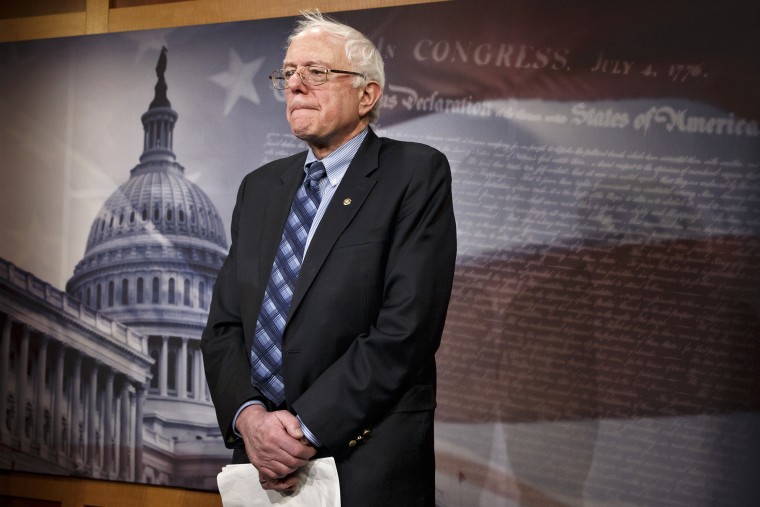The last time Sen. Bernie Sanders (I-Vt.) sponsored a bill related to veterans benefits, it was February. Sanders, who partnered with Sen. Chris Coons (D-Del.), put together a package of expanded VA health care access, tuition assistance, and job training, all of which enjoyed the support of the major veterans' groups.
Senate Republicans, citing the deficit and extraneous concerns, not only opposed the bill, they wouldn't even allow the Senate to vote on it. Two GOP senators voted with the Democratic majority, but that wasn't enough to overcome opposition from 41 Republicans.
And so, Sanders is trying again, though this time, he worked out a deal with Sen. John McCain (R-Ariz.).
Speaking on the Senate floor, Sanders laid out details of the bipartisan proposal: resources for 26 new VA facilities in 18 states, $500 million to hire more doctors and nurses, provisions to improve the quality of care for survivors of military sexual assault, as well as provisions designed to help veterans and family members access higher education. "We have a crisis on our hands and that it is imperative that we deal with this crisis," Sanders said.
The Vermonter added, "Our job was to sit down and work out the best agreement. We did. Does it solve all of the problems facing our veterans? Absolutely not."
The fact that McCain was involved in the process came as something of a surprise, not because he's a veteran, but because the Arizona Republican has been an outspoken proponent of privatizing veterans' care over the objections of all the major veterans' organizations.
With this in mind, it's worth noting that the Sanders/McCain compromise includes a provision intended to generate Republican support: "[I]t would also allow veterans to get private care if they are experiencing long wait times or are more than 40 miles from a VA facility."
The 40-mile rule, Sanders reminded reporters today, is temporary -- it will expire in two years.
Like the bill that Republicans killed in February, the proposal also includes "in-state tuition for all veterans at public colleges and universities. Surviving spouses of soldiers who die in the line of duty would also get tuition aid."
Looking ahead, and with February's filibuster in mind, the next question is whether the bill can pass.
It's far too early for a reliable head-count, but I think it's fair to say the measure stands an excellent chance, at least in the upper chamber.
Note, for example, that Sen. Chuck Schumer (D-N.Y.) told Roll Call, "It's a very good agreement. It focuses both on the accountability issue but also on the issue of solving the problem so there aren't such long waiting lists and veterans get the health care they need more quickly." Asked about a possible timeline, Schumer said he expects a vote "very soon."
Sen. Mary Landrieu (D-La.), another supporter, said she expects the bill on the floor "next week."
House Republicans haven't commented yet, though given the prevailing winds, it's going to be awfully difficult for even the most reflexive opponents of government spending to balk at these kinds of public investments -- especially in an election year.
